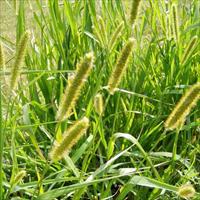NIGERIA: Cattails smother livelihoods of farmers and fishermen in Jigawa State

A species of cattail grass known locally as 'kachalla' is taking over river banks and farmlands around the Hadejia-Komadugu-Yobe wetlands in northern Nigeria’s Jigawa state, disrupting farming and fishing activities on which inhabitants rely.
“Fishermen cannot fish in the river because it has been taken over by the grass,” Jigawa state environment commissioner Yusuf Mato told IRIN.
“Kachalla has crippled economic activities, destroying not just fishing but farming as well”, he said. “They are the only two sources of wealth and employment in the area.”
Typha australis, as the species is called, has an entangled roots system that spreads rapidly, blocking river canals and taking over farmland. The areas worst affected are in the eastern part of this rural, agrarian state, including the districts of Birniwa, Guri, Kirikasamma, Auyo and Hadejia.
“It is quite a disaster,” Jigawa State governor Sule Lamido, told IRIN.
The grass only began to be noticed in the state after the construction of dams and barrages in 1972, according to agricultural researcher Umar Hassan Birniwa.
“Its spread has been rapid,” he said. In the last 20 years the land area infested has doubled to almost 10 percent of Jigawa State’s total landmass of 22,410 sq km. And typha is currently spreading annually at a rate of 10 percent, he added.
The problem for farmers is that when they try to pull the weed out of the ground, the top comes off but the root survives and the grass spreads further, the experts say.
“Farmers just dump the weeds they remove on the edge of their farms… which enhances the growth cycle,” Fouad Abba Jibrin a botanist at Bayero University Kano, told IRIN. “Typha grass has a high “water retention capacity” [and] can survive even when burnt.”
Fish loss
The Hadejia River is particularly rich in fish that sell in Kano, the commercial capital in the north, as well as in Nigeria’s capital Abuja, but the grass makes fish much harder to catch, Muazu Salmanu, a 56 years old fisherman who has been fishing along the Hadejia for 32 years.
“I used to catch at least 30 kilos of fish but now I hardly make a catch worth six kilos,” he said. “This has made life difficult for me and my wife and seven children - I don’t have any other way of making a living.”
The grass blocks some waterways so completely that during the rainy season it causes flooding of surrounding villages and crop fields. This then allows the grass to spread inland.
Farming problems
Farmers say that nowadays they need twice the amount of land they did 20 years ago to cultivate the same amount of produce. “Some 15 years ago the yield from three hectares was enough to feed me and my family for the whole year but now I need six hectares to get the same yield because a substantial part of the land has been taken over by Kachalla,” Wakili Haladu, a local farmer in Hadejia who grows rice, sorghum, cowpea and sesame told IRIN.
The grass also provides a breeding ground for birds, especially the miniature red-beaked quelea which invades farmlands and has destroyed many fields of crops before they could be harvested, Mato said.
Farmers and their children spend the best part of the growing season shooing the birds with drums and bonfires, often disrupting the children’s education.
“When my father’s crops begin to mature I had to stop my studies to help him guard against the quelea birds,” 14 years old Salele Nuhu, from a secondary school student in Hadejia, told IRIN.
Solutions
According to Mato, the state environment commissioner, Jigawa State conducted a feasibility study which found that controlling the weed would cost US$6 million, money it is now seeking to borrow from the Islamic Development Bank (IDB).
But Jibrin, the botanist at Bayero University, said $6 million may not be enough to tackle the problem. “Just the research and analysis needed to [determine] the best control strategy… will take at least four months,” he said.
He also said the state government needs to look at the problem in relation to other environmental factors. “The easiest way to contain it is with chemical applications but this has the disadvantage of killing fauna.”
Another possible method is biological, involving the introduction of a plant parasite to compete with the grass. He said this could be combined with a programme to cut the buds off typha grass to inhibit cross pollination of seeds.
But he added that even if Jigawa state succeeded in getting rid of the grass, the weed would likely regenerate because the government does not control water pollution. “The presence of heavy metals in water provides fertile ground for the growth of typha grass,” he said.
 Back and Next - Back and Next
Back and Next - Back and Next See Also - See Also
See Also - See Also